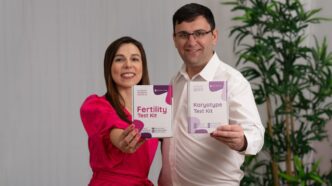Infertility affects 1 in 6 people globally, bringing emotional and financial strain to millions of families. On average, couples wait over 3 years just to receive a proper diagnosis, only to face generic, trial-and-error treatments that often don’t work. Enhanced Fertility, a UK-Portugal-based healthtech startup, is aiming to rewrite that story—with AI-powered fertility diagnostics that cut the time-to-treatment to less than 30 days.
During the SIM conference in Portugal, co-founder and CTO Frank Khan Sullivan shared how the company is changing lives. “We offer more than 100 at-home tests and use machine learning to analyse patient data against 1.4 million anonymised records. This reduces the diagnosis time drastically and allows for truly personalised treatment.”
In just 18 months, Enhanced Fertility has helped 30 babies be born—a major feat in a world where average IVF success per cycle is only 30%. Their secret? A data-driven, holistic approach that addresses not just the medical side, but also emotional health, nutrition, exercise, and psychological support.
From 3 Years to 30 Days: Reinventing Fertility Care with AI
Founded by Andreia Trigo and Frank Khan Sullivan, the startup was born from a deeply personal journey. Andreia was diagnosed with infertility at 17 after being born without a uterus. That moment pushed her to become a nurse, an advocate, and now a founder on a mission to make reproductive care more accessible and effective.
“Our goal is to help families get the care they need—faster,” Andreia says. “No one should have to wait years just to get answers.”
With that mission in mind, the company has grown from a two-person team to eight, with a 50/50 gender split at both board and team level. They’ve partnered with over 20 clinics and private hospitals across Europe and are now piloting AI-powered diagnostics in public healthcare through a project with Hospital de Braga and Global Health Accelerator.
Inside EnhancedDx: AI-Powered Fertility Diagnostics Built for Real Life
At the core of Enhanced Fertility is EnhancedDx, a proprietary AI system that processes lab tests, imaging, and patient history across 70 different conditions. It delivers a “Patients Like Me” report that personalises care recommendations down to medication, lifestyle changes, and mental health support.
“We’ve built seven machine learning models that work in parallel,” explains Sullivan. “It’s the start of a multi-agent AI system that doesn’t just automate diagnostics—it tailors treatment to each individual’s life and body.”
This holistic platform takes into account everything from hormonal imbalances and ovarian cancer history to IVF cycles and lifestyle choices. It’s a far cry from traditional systems that overlook key patient differences.
As Sullivan notes, “A 25-year-old cancer survivor doesn’t need the same care plan as a 40-year-old navigating IVF for the third time. Personalisation directly impacts outcomes.”
And it’s not just theory. Recent studies show that AI can significantly improve embryo selection and IVF success rates, making Enhanced Fertility’s solution both clinically validated and future-ready.
A Million Babies and Beyond
To date, Enhanced Fertility has raised €400,000 through grants and angels. With 30% monthly revenue growth, the company is now opening a €2 million funding round in June to scale its AI technology, expand in the EU, and enter the U.S. fertility market—the largest in the world.
The team is also exploring how its tech can apply to chronic conditions like diabetes and cardiac care, where fast, personalised diagnostics can be life-changing.
“Health isn’t just about medicine,” says Sullivan. “It’s about recognising the whole person—what they eat, how they move, how they feel. Our technology reflects that.”
Built on a GDPR-first foundation and aligned with NHS digital standards, the platform is already trusted by healthcare providers and ready to scale across chronic care verticals.
The vision is bold: to help a million babies be born, while building an AI infrastructure that improves care across all of medicine.
“We’re focused on outcomes,” says Sullivan. “Fertility is just the beginning.”













